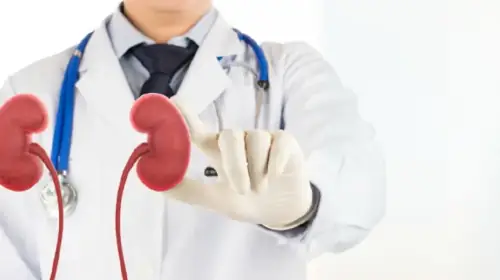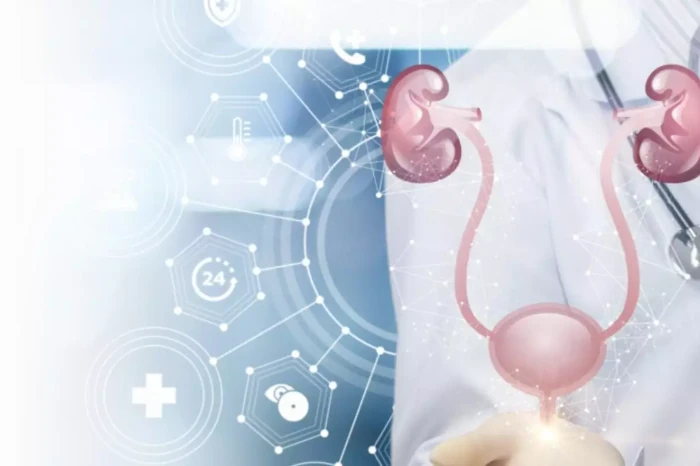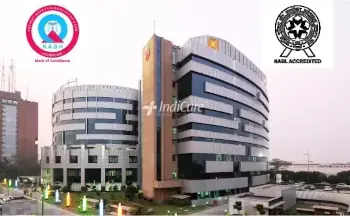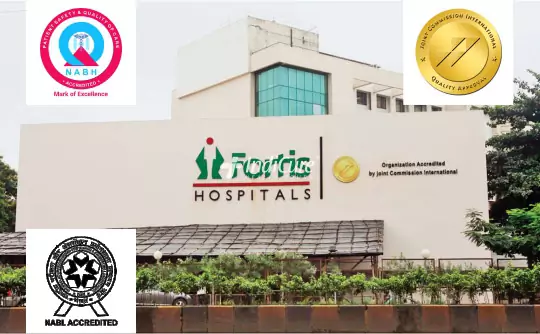

Radical Prostatectomy Cost in India starts from US $4,700 and varies depending on your medical condition and history, comorbidities- if any, technique of surgery, surgeon, facility and the city where you choose to get the surgery done.
An important expense when it comes to your radical prostatectomy cost in India is going to be your surgeon's fees. IndiCure recommends highly experienced, skilled, board-certified surgeons who are capable of delivering successful surgeries. Although the charges may vary depending on the experience of the surgeon, you can be assured that you are in safe and skilled hands when you choose medical treatment in India with IndiCure.
There are different techniques to perform radical prostate removal surgery. While one may need an open surgery, another may be a good candidate for laparoscopic or robotic prostate removal surgery, which affects the overall cost of prostatectomy.
Besides, a significant portion of the overall cost of the surgery arises from the use of any customized surgical instruments or specialized computer technology. With the hopes of improving patient care, new techniques and technologies are often introduced to the surgical process. Such innovative advancements in the surgical approach can increase costs.
Having your radical prostatectomy in an accredited surgical facility by skilled and qualified medical staff is a critical factor. Moreover, the geographical location of this facility also affects the quote. But, IndiCure provides you with a projected estimate that will be all inclusive and affordable.
The surgery-related expenses include the pre- and post-surgical expenses. The pre-surgical expenses are associated with the candidacy and the medical history of the patient. This also includes the routine medical exams and tests to ensure you're a good fit for the surgery. Post-surgical expenses may include prescription medications and follow-up consultations.
We at IndiCure, understand that you travel with a budget in mind and do not like to be greeted by surprises after arrival in India. We thus club all these expenses and give you the package cost that is inclusive and affordable at the same time.
Your case manager shall give you an estimated cost of your surgery after discussing your medical reports with the surgeon. The final cost, however, shall be confirmed after your consultation with the surgeon.
In fact, we have Special Negotiated Rates with the Hospitals and you can avail Discounted Rates when you choose to Travel with IndiCure.


We Help you Choose the Right Treatment, Surgeon & Hospital

We Arrange Video/Telephonic Consultation with the Surgeon

We Assist you with Visa & Accommodation

We Receive you at the Airport and Drop you at Hotel/Hospital

We Assist you the at Hospital & Provide Post Operative Support

New Delhi
BL Kapur Memorial Hospital is one of the biggest standalone private hospitals in Delhi, NCR. Established by late Dr. B L Kapur, an eminent Obstetrician, and Gynecologist on invitation by then Prime Minister of India, Mr. Jawahar Lal Nehru. The institute went on to become one of Delhi's premier multi-specialty hospitals.

Mumbai
Fortis Hospital, Mulund is a 300 bedded multispeciality tertiary care facility situated in the centre of the city, offering a range of clinical, diagnostic, and surgical services. The hospital began operations in 2002 and since then has achieved various milestones.
The best way to treat prostate cancer is to have the prostate gland surgically removed, a procedure called radical prostatectomy. The entire prostate, as well as any adjacent tissues such as seminal vesicles and some nearby lymph nodes that may carry cancer, are removed during a radical prostatectomy. When a man's cancer is localized to the prostate, radical prostatectomy is usually the procedure of choice.
There are different techniques to perform Radical Prostate Removal Surgery (Prostatectomy),which include open, laparoscopic or robotic. Open prostatectomy is the standard method of removing the prostate gland. Another, more contemporary method is minimally invasive surgery. Laparoscopic prostatectomy and robot-assisted laparoscopic prostatectomy are two minimally invasive procedures used in radical prostatectomy.
Radical prostatectomy is most beneficial for men younger than 75 who have limited prostate cancer and expect to live at least 10 more years.
Prostate cancer surgery is best for those who have cancer that is restricted to the prostate, are under 75 years old, and are otherwise healthy.
The prostate gland is separated from the surrounding tissue by the surgeon. The seminal vesicles, which are two little fluid-filled sacs located close to your prostate, are also removed.
The urethra is reattached to the bladder neck, which is a component of the bladder. The urethra is a tube that runs from the bladder to the penis, carrying pee.
To screen for malignancy, your surgeon may remove lymph nodes in the pelvic. After surgery, a Jackson-Pratt drain may be left in your stomach to remove any excess fluid. To drain urine, a tube (catheter) is left in your urethra and bladder. This will last anywhere from a few days to several weeks.
The majority of people spend one to four days in the hospital. You may be able to return home the same day as your laparoscopic or robotic surgery. For at least one month after surgery, doctors advise against excessive exertion or heavy lifting. The majority of people take three to four weeks off work.
In comparison to a traditional prostatectomy, robot-assisted prostatectomy can result in less pain and blood loss, less tissue trauma, a shorter hospital stay, and a faster recovery time. Around four weeks after surgery, you should be able to resume routine activities with few restrictions.
Prostatectomy is a simple procedure that provides long-term relief from urinary symptoms caused by an enlarged prostate. Although it is the most invasive surgery for treating an enlarged prostate, it has a low risk of significant consequences. The majority of men who get the operation don't require any additional BPH therapy.
We at IndiCure completely understand your concerns and it is always our endeavor to provide the best outcome for every patient. Following is the list of questions you must ask before you embark on your journey for radical prostatectomy in India.
Prepare to answer questions about your:

Prostatectomy is most commonly used to treat localized prostate cancer. It can be used on its own or in combination with other treatments including radiation, chemotherapy, and hormone therapy. To treat men with localized prostate cancer, a radical prostatectomy is a surgery that removes the entire prostate gland and associated lymph nodes.
The goal of a radical prostatectomy is to eliminate prostate cancer completely. It is a serious procedure with the potential for complications. This form of surgery may not be essential if you're an older man with slow-growing prostate cancer.
Based on the natural history of localized prostate cancer, males treated with radical prostatectomy (RP) or definitive external-beam radiation (EBRT) should have a life expectancy (LE) of more than ten years.
Urinary incontinence (inability to control urine) and erectile dysfunction are the most common side effects after radical prostatectomy (impotence; problems getting or keeping erections). Other types of prostate cancer treatment can also cause these side effects.
Prostate cancer can recur after a prostatectomy. According to a 2013 study, 20-40% of men with prostate cancer relapse within 10 years of undergoing a radical prostatectomy.
Following your operation, your doctor may prescribe drugs such as sildenafil, vardenafil, or tadalafil. These drugs act by increasing blood flow to the penis, which may help you get an erection again.
Because prostate removal is a big procedure, expect some discomfort and anguish. At first, you'll be given pain medicine by IV, and your doctor may also prescribe pain medication for you to take at home. For the first week, you will also have a urine catheter in place, which you may find painful.
No is the answer! If there is urine in the bladder (which there almost always is), it will flow right out. Men who don't have a prostate need to find another technique to control their urinating.
By six months after surgery, the majority of men have significantly improved. For security, many men may continue to wear a very thin pad." Kegel exercises, which strengthen the pelvic floor muscles, are a common first-line treatment for urine incontinence.
By six months after surgery, the majority of men have significantly improved. For security, many men may continue to wear a very thin pad." Kegel exercises, which strengthen the pelvic floor muscles, are a common first-line treatment for urine incontinence.After a radical prostatectomy to remove the prostate gland, you may experience bladder issues such as leaks and difficulties passing urine. Urine leakage is one of the most prevalent complications following a radical prostatectomy.
In men who have had their prostate removed, Viagra is an excellent treatment for impotence. The medicine enhances the capacity to get an erection by approximately 60% in men who have nerves spared, while it only works 20% of the time in guys who have no nerves spared.
In the weeks after the catheter is removed, most patients regain control. Within 3 to 18 months after surgery, the vast majority of men who had normal urine control before the treatment regain it.
A PSA of more than 0.2 ng/ml is considered high following prostatectomy. If the prostate cells have developed to the point where detectable amounts of PSA may be detected, this could be concerning for both the patient and the doctor.
Enhance your medical journey to India by availing these extra services.
Traveling abroad for medical reasons may be challenging. With our experience of over a decade and working with the best surgeons and top hospitals in India, we help make your medical tour easier and safer for you. We will guide you at every step of the way and make end-to-end arrangements for your surgery, travel, and stay.
Ramandeep Dhaliwal
a month ago
I had great experience having rhinoplasty through Indicure. Dr. Ruchika from Indicure has helped me in finding best plastic surgeon, answering all my questions...
Read More
Joshua Archer
3 months ago
My name is Joshua Archer I'm from New Zealand, bay of plenty, kawerau I opted for the bypass surgery in January 2023 but planned it in advance for 28 September found IndiCure...
Read More
Kera Ren
8 months ago
Absolutely loved my experience with IndiCure - from first inquiring to meeting the surgeon pre op to my follow up post op. The surgeon was extremely approachable...
Read More
Andreana Paul
5 months ago
Had a wonderful experience. Visited India for my plastic surgery. From sending mails, airport pickup, comfortable accommodation and, to smooth hospital appointment booking...
Read More
Brandi Luce
5 months ago
I had the privilege of using Indicure's services for a cosmetic procedure that I had wanted for a long time but had always been apprehensive about. Ruchika helped me...
Read More
Jade M
3 years ago
Indicure Health Tours went above and beyond my expectations. They helped me with every aspect of my journey and were professional, kind and caring. I was...
Read More
The content on the website (www.indicure.com) is intended to be general information and is provided only as a service. All photographs on our website of before and after results are examples only, and do not constitute an implied or any other kind of certainty for the result of surgery.
Learn about IndiCure Health Tours' comprehensive editorial policy that strives to deliver trustworthy, helpful, relevant, accurate and people-first content on medical tourism in India.
It is not medical advice and should not be taken as medical advice. It should not be used to diagnose or treat a health condition and is in no way meant to be a substitute for professional medical care. You are advised to see a surgeon in person to assess what surgery may or may not accomplish for you.
It is also important to keep your expectations realistic and to understand that all surgical procedures carry risks and should never be taken lightly.